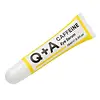What's inside
What's inside
 Key Ingredients
Key Ingredients

 Benefits
Benefits

 Concerns
Concerns

 Ingredients Side-by-side
Ingredients Side-by-side

Water
Skin ConditioningPersea Gratissima Oil
Skin ConditioningPropanediol
SolventCoco-Caprylate/Caprate
EmollientPolyglyceryl-3 Distearate
EmulsifyingPanthenol
Skin ConditioningGlycerin
HumectantBetaine
HumectantCetearyl Alcohol
EmollientTrehalose
HumectantPhytosterols
Skin ConditioningSorbitol
HumectantCeramide NP
Skin ConditioningCeramide AP
Skin ConditioningCeramide EOP
Skin ConditioningHyaluronic Acid
HumectantHydrolyzed Hyaluronic Acid
HumectantSodium Hyaluronate
HumectantSodium Hyaluronate Crosspolymer
HumectantOlea Europaea Fruit Oil
MaskingCholesterol
EmollientPhytosphingosine
Skin ConditioningInulin
Skin ConditioningCellulose
AbsorbentFructose
HumectantGlucose
HumectantMaltodextrin
AbsorbentHydrolyzed Glycosaminoglycans
HumectantTocopheryl Acetate
AntioxidantTetrasodium Glutamate Diacetate
Polyglyceryl-10 Stearate
Skin ConditioningPolyglyceryl-6 Behenate
Emulsion StabilisingAscorbyl Palmitate
AntioxidantXanthan Gum
EmulsifyingCellulose Gum
Emulsion StabilisingBiosaccharide Gum-1
HumectantParfum
MaskingSorbitan Oleate
EmulsifyingCitric Acid
BufferingTriethyl Citrate
MaskingGlyceryl Stearate Citrate
EmollientGlyceryl Stearate
EmollientBehenic Acid
CleansingBenzyl Glycol
SolventEthylhexylglycerin
Skin ConditioningRaspberry Ketone
MaskingSodium Cetearyl Sulfate
CleansingSodium Levulinate
Skin ConditioningSodium Benzoate
MaskingSodium Sulfate
Sodium Hydroxide
BufferingPotassium Sorbate
PreservativeAmyl Cinnamal
PerfumingCI 19140
Cosmetic ColorantCI 42090
Cosmetic ColorantWater, Persea Gratissima Oil, Propanediol, Coco-Caprylate/Caprate, Polyglyceryl-3 Distearate, Panthenol, Glycerin, Betaine, Cetearyl Alcohol, Trehalose, Phytosterols, Sorbitol, Ceramide NP, Ceramide AP, Ceramide EOP, Hyaluronic Acid, Hydrolyzed Hyaluronic Acid, Sodium Hyaluronate, Sodium Hyaluronate Crosspolymer, Olea Europaea Fruit Oil, Cholesterol, Phytosphingosine, Inulin, Cellulose, Fructose, Glucose, Maltodextrin, Hydrolyzed Glycosaminoglycans, Tocopheryl Acetate, Tetrasodium Glutamate Diacetate, Polyglyceryl-10 Stearate, Polyglyceryl-6 Behenate, Ascorbyl Palmitate, Xanthan Gum, Cellulose Gum, Biosaccharide Gum-1, Parfum, Sorbitan Oleate, Citric Acid, Triethyl Citrate, Glyceryl Stearate Citrate, Glyceryl Stearate, Behenic Acid, Benzyl Glycol, Ethylhexylglycerin, Raspberry Ketone, Sodium Cetearyl Sulfate, Sodium Levulinate, Sodium Benzoate, Sodium Sulfate, Sodium Hydroxide, Potassium Sorbate, Amyl Cinnamal, CI 19140, CI 42090
Water
Skin ConditioningPropylene Glycol
HumectantBetaine
HumectantPentylene Glycol
Skin ConditioningCaffeine
Skin ConditioningCucumis Sativus Fruit Water
Skin ConditioningCollagen
MoisturisingBiosaccharide Gum-1
HumectantCamellia Sinensis Leaf Extract
AntimicrobialPunica Granatum Extract
AstringentLonicera Caprifolium Flower Extract
PerfumingLonicera Japonica Flower Extract
Skin ConditioningLactobacillus Ferment Filtrate
Skin ConditioningLeuconostoc/Radish Root Ferment Filtrate
AntimicrobialSodium Phytate
Glycerin
HumectantLactobacillus Ferment
Skin ConditioningXanthan Gum
EmulsifyingAlcohol
AntimicrobialSodium Levulinate
Skin ConditioningGlyceryl Caprylate
EmollientSodium Anisate
AntimicrobialLactic Acid
BufferingWater, Propylene Glycol, Betaine, Pentylene Glycol, Caffeine, Cucumis Sativus Fruit Water, Collagen, Biosaccharide Gum-1, Camellia Sinensis Leaf Extract, Punica Granatum Extract, Lonicera Caprifolium Flower Extract, Lonicera Japonica Flower Extract, Lactobacillus Ferment Filtrate, Leuconostoc/Radish Root Ferment Filtrate, Sodium Phytate, Glycerin, Lactobacillus Ferment, Xanthan Gum, Alcohol, Sodium Levulinate, Glyceryl Caprylate, Sodium Anisate, Lactic Acid
 Reviews
Reviews

Ingredients Explained
These ingredients are found in both products.
Ingredients higher up in an ingredient list are typically present in a larger amount.
Betaine is a common humectant (a substance that promotes retention of moisture). It's known to be gentle on the skin and can help balance hydration.
This ingredient is best for improving hydration and soothing irritated skin. Studies also show it helps even out skin tone.
Fun fact: Betaine is naturally created in the skin and body. The kind found within cosmetic products can be either plant-derived or synthetic.
Another name for betaine is trimethylglycine.
Learn more about BetaineBiosaccharide Gum-1 is a sugar created by fermenting sorbitol (which usually comes from potato starch!). It is known for its soothing and moisturizing properties.
Manufacturer tests show this ingredient helped reduce irritation from lactic acid by almost half and kept skin hydrated long-term as a humectant
Beyond hydration, Biosaccharide Gum-1 gives formulas a silky, non-sticky feel.
This ingredient is gentle, versatile, and suitable for all skin types.
Fun fact: Similar sugars can be found naturally in fruits like apples and pears.
Learn more about Biosaccharide Gum-1Glycerin is already naturally found in your skin. It helps moisturize and protect your skin.
A study from 2016 found glycerin to be more effective as a humectant than AHAs and hyaluronic acid.
As a humectant, it helps the skin stay hydrated by pulling moisture to your skin. The low molecular weight of glycerin allows it to pull moisture into the deeper layers of your skin.
Hydrated skin improves your skin barrier; Your skin barrier helps protect against irritants and bacteria.
Glycerin has also been found to have antimicrobial and antiviral properties. Due to these properties, glycerin is often used in wound and burn treatments.
In cosmetics, glycerin is usually derived from plants such as soybean or palm. However, it can also be sourced from animals, such as tallow or animal fat.
This ingredient is organic, colorless, odorless, and non-toxic.
Glycerin is the name for this ingredient in American English. British English uses Glycerol/Glycerine.
Learn more about GlycerinSodium levulinate is the a sodium salt of Levulinic Acid. If dissolved in an aqueous solution, the two ingredients become identical.
It is a skin conditioning agent, meaning it helps soften and hydrate your skin.
According to Cosmetic Ingredient Review, the highest amounts of sodium levulinate are found in mouthwashes at 0.62%.
Learn more about Sodium LevulinateWater. It's the most common cosmetic ingredient of all. You'll usually see it at the top of ingredient lists, meaning that it makes up the largest part of the product.
So why is it so popular? Water most often acts as a solvent - this means that it helps dissolve other ingredients into the formulation.
You'll also recognize water as that liquid we all need to stay alive. If you see this, drink a glass of water. Stay hydrated!
Learn more about WaterXanthan gum is used as a stabilizer and thickener within cosmetic products. It helps give products a sticky, thick feeling - preventing them from being too runny.
On the technical side of things, xanthan gum is a polysaccharide - a combination consisting of multiple sugar molecules bonded together.
Xanthan gum is a pretty common and great ingredient. It is a natural, non-toxic, non-irritating ingredient that is also commonly used in food products.
Learn more about Xanthan Gum